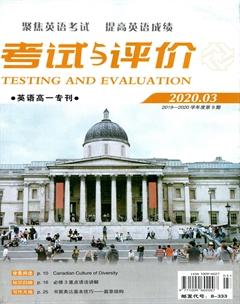必修3第5单元同步语法讲练
潘渊英
一、同位语从句的概念
同位语的作用是对前面的名词做进一步解释,说明该名词的具体内容。在复合句中充当同位语的名词性从句称为同位语从句。
二、可以引导同位语从句的抽象名词
(一)可以引导同位语从句的抽象名词通常有news, idea, fact, promise, question, doubt, thought, hope, message, suggestion, words(消息), possibility等。
I just got word that he is not coming this evening. 我刚刚得到消息他今天晚上不来了。
We haven't settled the question where we are going to spend our summer vacation. 我们还没决定去哪里过暑假。
There is no doubt that he is guilty. 毫无疑问他有罪。
There is great doubt whether he did it or not. 他有没有做这件事情还是有很大的疑问的。
(二)demand, order, suggestion, command等表示“建议,命令,要求”的抽象名词引导的同位语从句要用虚拟语气,即“should+do”的结构,should 可以省略。
There was a suggestion that Jack (should) leave at once. 有一项建议是杰克应该立刻离开。
三、同位语从句的关联词
引导同位语从句的词有连词that / whether、连接代词what / who / whom / whose / which、连接副词how / why / when / where等。
(一)从属连词
从属连词一般引导的同位语从句是一个完整的句子,起到连接主句和从句的作用。
1. 连词that
that在同位语从句中不充当成分,只起连接作用,同位语中的that不可省略。
The idea that I will forgive you is quite wrong. 我会原谅你的这个想法是完全错误的。
There is no doubt that the prices of cars will go down. 毫无疑问汽车价格会下降的。
2. 连词whether
在表示“是否”的时候,同位语从句只能用whether,不能用if。
The problem whether he is right hasn't been proved. 他是不是对的这个问题还未被证实。
He must answer the question whether he agrees to do it. 他必须回答他是否同意这么做。
(二)连接代词
连接代词what(什么), who(谁), whom(谁,作宾语), whose(谁的), which(哪一个)在同位语从句中充当一定的成分,有意义,不可省略。
I have no idea what he likes. 我不知道他喜欢什么。
The question who should go abroad hasn't been decided yet. 谁会出国这个问题还未决定。
I have no idea which book I should buy. 我不知道买哪一本书。
(三)连接副词
连接副词when(表时间), where(表地点), how(表方式), why(表原因)一般在从句中充当状语。
I've got a good idea why they left early. 我了解他们为什么离开得那么早。
The question where we should go has not been decided. 我们还没决定好去哪儿。
My question how I can find him has not been answered. 我怎样才能找到他这个问题还没有被回答。
四、同位语从句和定语从句的区别
(一)意义的不同
同位语从句是用来解释说明前面名词的具体内容,它与前面的抽象名词通常可以划等号;而定语从句是对前面名词予以修饰和限定。
The news that our team has won the final match is encouraging. (从句说明“消息”的内容:我们队取得了决赛胜利。)
The news that you told us is really encouraging. (从句对“消息”加以限定:是你告诉我们的,而非来自其他渠道,但消息是何内容却不得而知。)
(二)被修饰词的区别
同位语从句前面的名词通常是抽象名词,而且仅限于idea, plan, fact, theory, promise, hope, news, doubt, truth, information, suggestion, question, thought, belief, conclusion等少數名词,而定语从句的先行词则广泛得多,可以是名词、代词、主句的一部分或是整个主句。
The boy who is playing football is my classmate. (划线部分是定语从句,其先行词是名词 the boy,它不能引导同位语从句。)
Our team has won the game, which made us very happy. (劃线部分是定语从句,which指代“我们队伍赢了比赛”这件事情,整个主句做先行词,而同位语则没有这个功能。)
The fact that he had not said anything surprised everybody. (划线部分解释说明fact的内容,是同位语从句。)
(三)引导词that的不同
引导定语从句的that叫做关系代词,它除了起连接作用,还在定语从句中充当主语或宾语,在意义上等于先行词,作宾语时可以省略;引导同位语从句的that是从属连词,只起连接作用,不能省略。
The news (that) you told me yesterday was exciting. (划线部分是定语从句,that代替先行词news,在从句中作宾语,可以省略。)
We heard the news that our team had won. (划线部分是同位语从句,that无意义,只起连接作用,不能省略。)
【实战演练】
1. The fact ______ she works hard is well known to us all.
A. that B. what C. why D. which
2. The fact ______ he was successful proves his ability.
A. that B. what C. which D. why
3. The news ______ he was kidnapped surprised us greatly.
A. what B. that C. why D. when
4. His suggestion ______ the meeting be delayed was turned down.
A. which B. that C. / D. it
5. I have no idea ______ he will start.
A. when B. that C. what D. /
6. I've come from the government with a message ______ the meeting won't be held tomorrow.
A. if B. that C. whether D. which
7. The thought ______ he might fail in the exam worried him.
A. when B. which C. what D. that
8. The order ______ the prisoner be set free arrived too late.
A. which B. whether C. that D. what
9. The nurses are trying their best to reduce the patient's fear ______ he would die of the disease.
A. that B. as C. of which D. which
10. He often asked me the question ______ the work was worth doing.
A. whether B. where C. that D. when
11. Information has been put forward ______ more high school graduates will be admitted into universities.
A. while B. that C. when D. as
12. It is said that more high school graduates will be admitted into universities; this is the information ______ has been put forward.
A. what B. that C. when D. as
13. She heard a terrible noise, ______ brought her heart into her mouth.
A. it B. which C. this D. that
14. I can't believe the news ______ he was arrested.
A. it B. which C. this D. that
15. The fact ______ he failed in the exam is not the one ______ he told me.
A. which; that B. that; / C. which; which D. /; that

